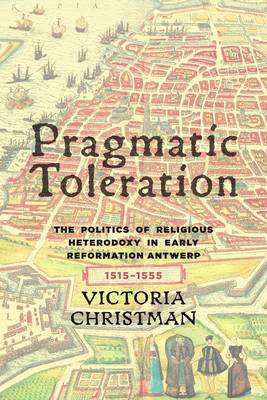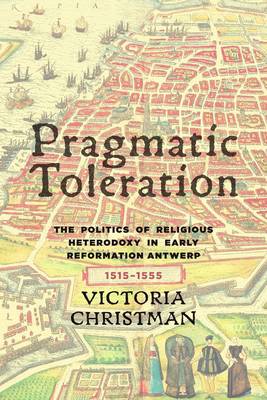
- Afhalen na 1 uur in een winkel met voorraad
- Gratis thuislevering in België vanaf € 30
- Ruim aanbod met 7 miljoen producten
- Afhalen na 1 uur in een winkel met voorraad
- Gratis thuislevering in België vanaf € 30
- Ruim aanbod met 7 miljoen producten
Zoeken
Pragmatic Toleration
The Politics of Religious Heterodoxy in Early Reformation Antwerp, 1515-1555
Victoria Christman
€ 217,95
+ 435 punten
Omschrijving
In a modern world still struggling to achieve religious coexistence, there has been a recent burgeoning of scholarship aimed at examining the history of such coexistence. Most of these studies focus on developments in the seventeenth century and beyond. This book redirects attention earlier, to the first half of the sixteenth century, and argues that impulses to toleration were already at work even amid the religious upheaval of the European Reformations. In the early modern metropolis of Antwerp, the author finds a wealthy merchant city struggling to balance the competing interests of municipality and empire. While their imperial overlords attempted to impose religious uniformity via increasingly repressive anti-heresy edicts, the city fathers of Antwerp found ways to circumvent those laws in order to accommodate the religious heterodoxy of their most valued inhabitants. The result was the development of pragmatically tolerant practices that arose in the service of fundamentally nonreligious motivations. Via a series of case studies, this book documents the development of such practices on the part of the Antwerp fathers as they defended their heterodox inhabitants. It seeks to understand the motivations underlying the councilors' lenient treatment of heterodoxy in their city, and attempts to answer the question of how we are to understand such pragmatically tolerant behavior as part of the broader history of religious tolerance in the Christian West. Victoria Christman is associate professor of history at Luther College.
Specificaties
Betrokkenen
- Auteur(s):
- Uitgeverij:
Inhoud
- Aantal bladzijden:
- 256
- Taal:
- Engels
- Reeks:
- Reeksnummer:
- nr. 17
Eigenschappen
- Productcode (EAN):
- 9781580465168
- Verschijningsdatum:
- 20/04/2015
- Uitvoering:
- Hardcover
- Formaat:
- Genaaid
- Afmetingen:
- 152 mm x 229 mm
- Gewicht:
- 544 g

Alleen bij Standaard Boekhandel
+ 435 punten op je klantenkaart van Standaard Boekhandel
Beoordelingen
We publiceren alleen reviews die voldoen aan de voorwaarden voor reviews. Bekijk onze voorwaarden voor reviews.







